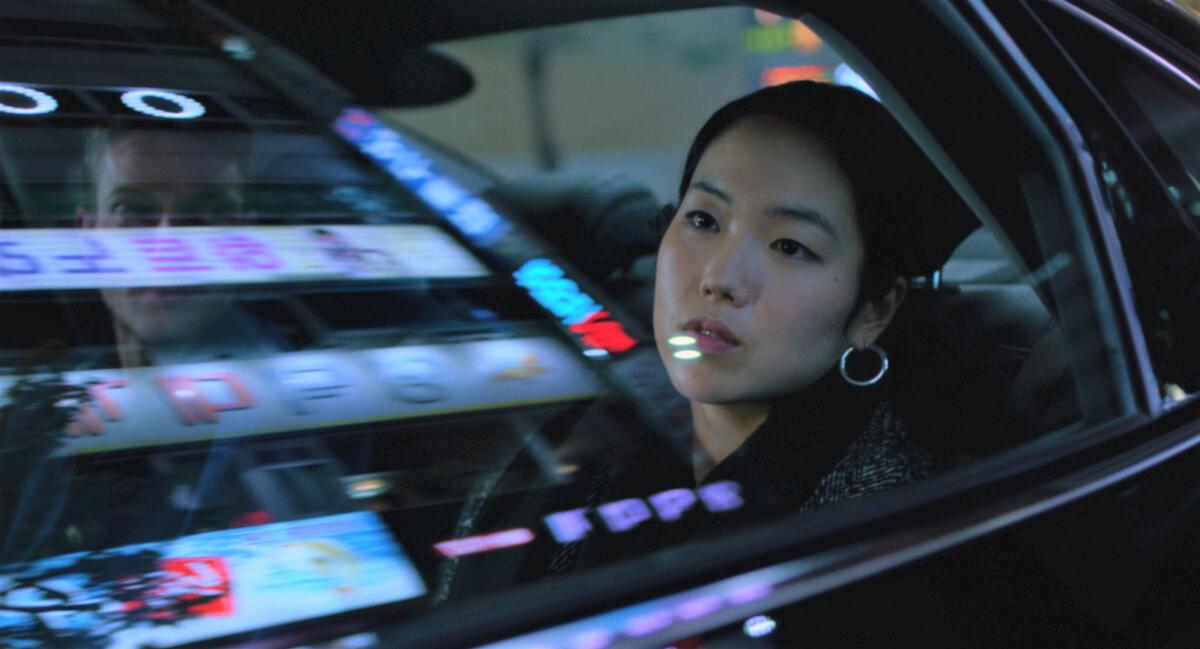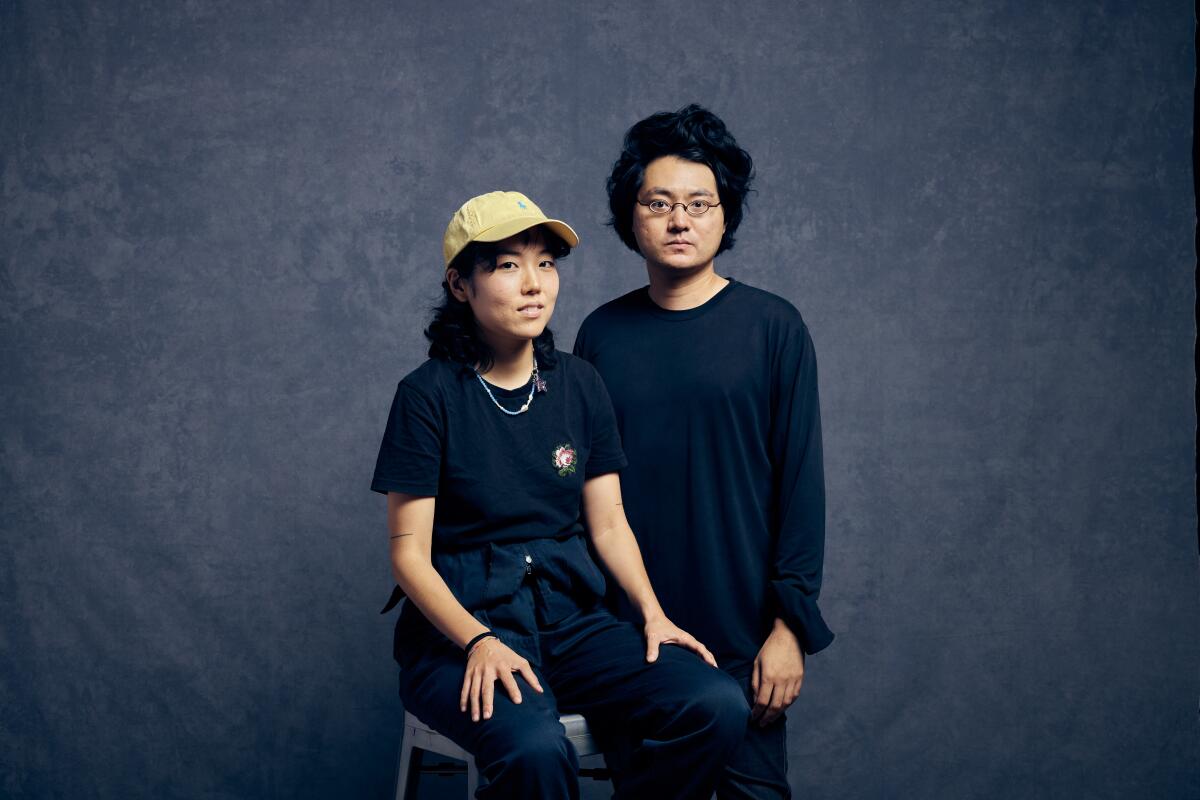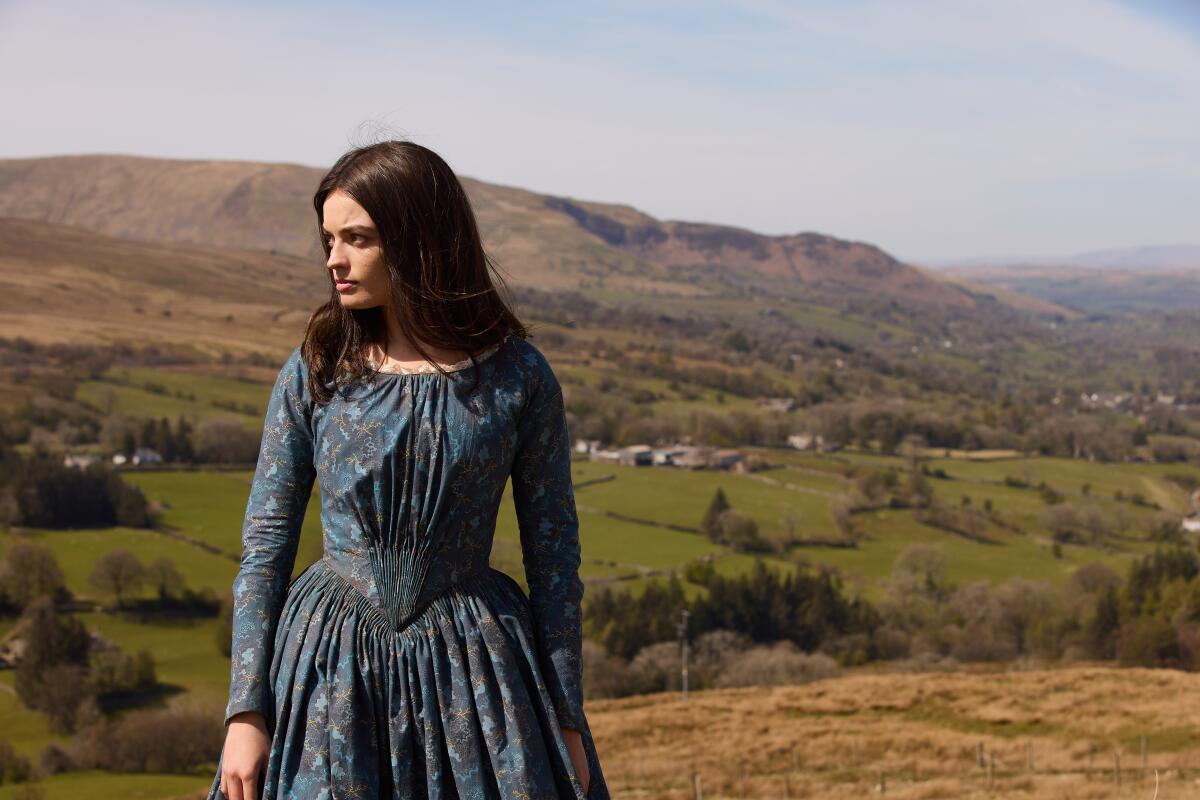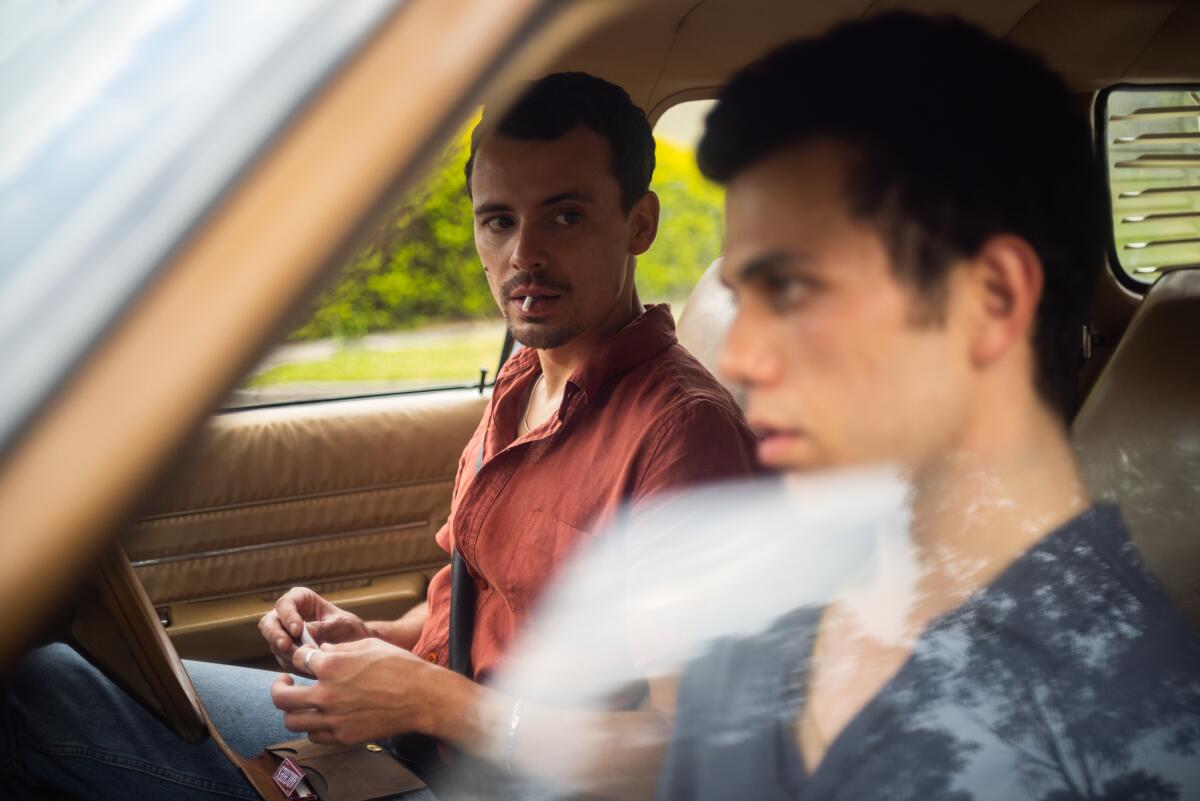Why ‘Return To Seoul’ could make Park Ji-Min a star, if she ever acts again

- Share via
Hello! I’m Mark Olsen. Welcome to another edition of your regular field guide to a world of Only Good Movies.
Only good movies
Get the Indie Focus newsletter, Mark Olsen's weekly guide to the world of cinema.
You may occasionally receive promotional content from the Los Angeles Times.
‘Crouching Tiger’ back in theaters Ang Lee’s 2000 film, “Crouching Tiger, Hidden Dragon,” still the most successful non-English language film ever in the U.S., has returned to theaters in a new 4K restoration. As Justin Chang wrote about the film, “This is a movie about, among other things, the mysterious inflections and operations of time: It’s about how a furiously kinetic fight scene can make the world stand still, and how years of silent suffering can pass by in an instant. … the movie has lost none of its dreamy beauty or hypnotic power, and that power still builds as assuredly and methodically as ever.”
One of the film’s stars, Michelle Yeoh, is a first-time Oscar nominee this year for her role in “Everything Everywhere All At Once.” I recently spoke to Yeoh for “The Envelope” podcast, and she talked about the possibility of becoming the first Asian woman to win for lead actress. As she said, “What does it mean to me? It means the whole world to me. Right? Maybe we did not start the journey by saying, ‘That’s where we want to get to,’ because you don’t! And then things have to happen. I think it was such a people’s movie. It’s so visceral how the connections have been made. So, yes! I keep praying every night. It’s like, thank you. Thank you for seeing me. Thank you for having given me that opportunity to show you what I really can do.”
‘2 Fast 2 Furious’ big & loud With the release of the recent trailer for the upcoming “Fast X,” there is a renewed sense of energy around the “Fast and Furious” franchise. The Academy Museum of Motion Pictures revs that excitement up even higher on Wednesday Feb. 22 with a 35 mm screening of 2003’s “2 Fast 2 Furious” in the very big and very loud David Geffen Theater. Showing as part of their ongoing tribute to director John Singleton, the screening will also include a post-screening conversation with actor Tyrese Gibson, producer Neal Moritz, co-writer Derek Haas, supervising sound editors Bobbi Banks and Greg Hedgepath and storyboard artist Warren Drummond.
Desiree Akhavan at UCLA The UCLA Film and Television Archive, as part of their ongoing collaboration with Outfest, will screen Desiree Akhavan’s 2014 debut feature “Appropriate Behavior” on Saturday Feb. 18. The movie established Akhavan as a fresh and distinctive voice, with the filmmaker starring as a bisexual Iranian American 20-something attempting to navigate the expectations and pressures of family and friends alike. Akhavan is scheduled for a Q&A with scholar Maria San Filippo.
Enjoying this newsletter? Consider subscribing to the Los Angeles Times
Your support helps us deliver the news that matters most. Become a subscriber.
‘Return to Seoul’
Written and directed by Davy Chou, the rightfully celebrated “Return to Seoul” has returned to theaters after a brief qualifying run at the end of last year. Park Ji-Min, in her first acting role, stars as Freddie, an impulsive, enigmatic young woman who returns to her native Korea after having been away since she was adopted by a French family as a little girl. The story follows her over a number of years as she grapples with her Korean identity.
For The Times, Carlos Aguilar called the film “A staggering masterwork” in which “the richness in every detail, and their unexpected ramifications over time, make for a one-of-a-kind character study.” Carlos added, “Worthy of multiple viewings, ‘Return to Seoul’ establishes that in our fixation with resolutions, with the certainty of forever-afters, we fail to realize that human existence entails pausing and restarting, forgetting and remembering, hurting and forgiving, learning and leaving behind. Nothing is definitively lost nor permanently gained, but all is cycling within us, always, as we contain all the people we once were and all of those we’ll never be.”
Robert Abele spoke to Park and Chou about their collaboration, capturing the spirit of the friendship that has grown between them. As Chou said,“I was obsessed in the preparation with the idea of chaos and control. How to film someone trying to control the chaos. The heavy topic of identity has so many cliches, preconceived ideas of reconciliation and closure. So to have such a happily destructive character was stimulating.”
For the New York Times, Amy Nicholson said it is “a startling and uneasy wonder, a film that feels like a beautiful sketch of a tornado headed directly toward your house,” adding, “The director is intrigued by dislocation, and is attentive to both its dry specifics and its messy frustrations.”
For Variety, Jessica Kiang wrote, “Though [Freddie] is the last to admit it, there is more to her jaunt to Korea than coincidence and idle curiosity. While Chou’s elliptical screenplay gently explodes many preconceived assumptions about the effects of adoption on adoptees, it is too clear-sighted to ignore the fact that whether biology affects identity or not, the mere possibility that such a link exists could exert a powerful attraction on a searching spirit not quite sure what it is searching for. … Park, a first-time actress tasked with bringing consistency to a character so divided against herself she could be three or four different people, embodies Freddie’s contradictions with riveting ease.”
For Vulture, Angelica Jade Bastién wrote, “There are no grand speeches, no sudden or dramatic upheavals, no twinkling score to mawkishly pull at your heartstrings. ‘Return to Seoul’ carries itself with a gentle forcefulness. Language — the barriers and different effects of French, Korean, and, occasionally, English — becomes the method and medium to acknowledge the fractures inside Freddie, bringing up questions about how she sees herself and her place in the world. … Ultimately, Chou doesn’t just point to the racial and cultural forces that shoot through Freddie’s life; he uses them to carefully consider her — her taste in men, how she dresses, the way she walks. In ‘Return to Seoul,’ who we are, who we want to be, and who we’re running away from being are in ragged flux.”

Enjoying this newsletter? Consider subscribing to the Los Angeles Times
Your support helps us deliver the news that matters most. Become a subscriber.
‘Emily’
Written and directed by Frances O’Connor, up to now best known as an actor in films such as “Mansfield Park,” the new “Emily” tells the story of “Wuthering Heights” author Emily Brontë (played by Emma Mackey) and her family, playfully weaving together fact and fiction. The film is in theaters now.
For The Times, Justin Chang wrote, “Written and directed by the Australian actor Frances O’Connor, making a vibrant feature filmmaking debut, it will surely madden sticklers for accuracy, which is all to the good. Those who demand strict conformity, at least in this absorbing and unapologetic fiction, are precisely the kind of people the fiercely independent-minded Emily can barely stand. … At one point, Charlotte cruelly dismisses ‘Wuthering Heights’ as ‘an ugly book … full of selfish people who only care for themselves.’ It’s another liberty; the real-life Charlotte, though a frequent critic and arbiter of her sisters’ published work, was hardly blind to the beauty of Emily’s masterpiece. The same can be said of O’Connor’s movie. Far from suggesting that art imitated life, it ends with the bracing suggestion that the Brontës, like any of us, could scarcely appreciate one without the other.”
Emily Zemler examined in more depth the ways in which the movie diverges from the real-life story of the Brontës. As O’Connor put it, “I wrote this the way Emily wrote ‘Wuthering Heights.’ She did the research, she let her imagination go to these deep, dark places and then this work came out. I let my research be in different avenues and then I used those elements to craft a story that is about who she is — somebody who had a very authentic voice but didn’t really fit in. A lot of women feel like that or have felt like that.”
For the New York Times, Manohla Dargis wrote, “O’Connor’s liberties work for a story that, above all, is about art as an act of radical sovereignty. Building on a series of oppositions — nature and culture, realism and romance, duty and freedom — O’Connor brings Emily the myth to vibrant life, persuasively suggesting that this ostensibly strange and cloistered genius came into being not despite her contradictions but through them. At once a woman of her time and free of its limitations, her Emily is corseted and unrestrained, respectable and scandalous, one of life’s astonishing escape artists who endures brute reality only to bend it to her own thrilling ends.”
For rogerebert.com, Marya E. Gates wrote, “On principle, this take on the mysterious literary figure isn’t necessarily bad. Unfortunately O’Connor’s execution is. While there’s some fire under Mackey’s sullen expression, much of her direction seems to have been to make her eyes as wide as possible and to keep her mouth always in a somber pout. Worse, O’Connor anchors Emily’s artistic coming-of-age to a rote romance with a hunky curate who also tutors her in French. … O’Connor’s debut is ambitious for sure, but with imagery ripped from countless better period set films, an overbearing score from Abel Korzenioski, and an outdated way of pitting women against each other, I could only think that Emily’s legacy deserved better than this.”

‘Of An Age’
Written and directed by the Macedonian Australian filmmaker Goran Stolevski, “Of An Age” is the follow-up to his 2022 debut, the witch fable “You Won’t Be Alone.” Set in Australia, the new film tells the story of Kol (Elias Anton), who has a transformative romance with Adam (Thom Green). The film is in theaters now.
For The Times, Katie Walsh wrote, “‘Of an Age,’ which takes place over the course of two 24-hour periods set 11 years apart, is like ‘Before Sunrise’ and ‘Before Sunset’ combined into one film, in which two characters are rocked by a chance encounter and reckon with it years later. … Impeccably written and beautifully performed by Anton and Green, ‘Of an Age’ is a profoundly moving film about the beauty and the horror of what it means to be seen for the first time, to love for the first time, and how the past and future are constantly informing each other.”
For the New York Times, Manohla Dargis wrote, “One of the trickier hurdles that romantic movies need to clear is convincing the viewer to swoon, too. That bar proves insurmountably high in ‘Of an Age,’ a confident if unpersuasive story about a quintessentially alienated teenager falling for a guy in his mid-20s who checks all the heartthrob boxes: He’s kind, good looking, has a nice smile and seems to like the attention directed at him. Yet why this object of desire, an ostensibly serious thinker en route to grad school, would fall for our charisma-challenged protagonist remains thoroughly mystifying. … The movie’s greater, intractable problem, though, is that Stolevski has burdened his characters with such obvious narrative instrumentality — Kol is the sensitive naïf while Adam is the appealing, gentle exemplar of an authentic life — that the two simply never come to life as people, either as individuals or as a couple. They say and do everything that they should, and also everything that you expect.”

Only good movies
Get the Indie Focus newsletter, Mark Olsen's weekly guide to the world of cinema.
You may occasionally receive promotional content from the Los Angeles Times.




